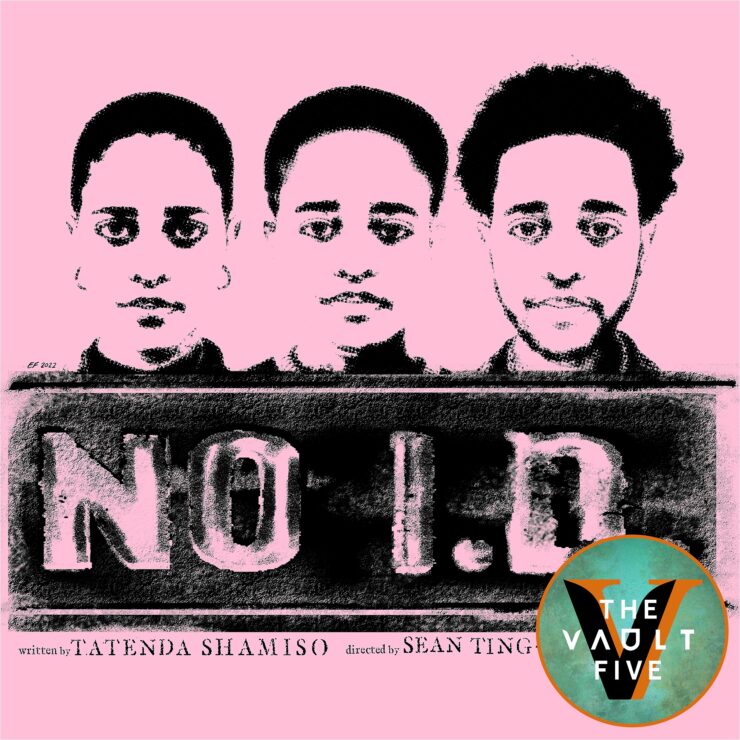NO I.D. is Tatenda Shamiso’s raucously unapologetic, goofily defiant, often Kafkaesque ode to his Trans identity. With clownish whimsy and charming flight, Tatenda takes us down the rabbit hole of the bureaucracy facing Trans people during their transitions – tackling the medicalisation of the Trans mind, registering to file your tax returns when your gender marker hasn’t been changed, the process of getting a deed poll and settling in the UK as an EU Citizen – it’s perhaps no surprise that by the end of the piece he finds himself quite literally buried in a mass of paperwork, file boxes and the weight of expectations that bureaucratic society places on Trans people just to prove that they are who they know themselves already to be.
Tatenda is on hold with the ‘NO I.D. Hotline’, and it isn’t a moment before the hold music becomes his jam, quickly establishing the playfulness and joyfuly angst with which he approaches the bureaucracy that faces him as a Black Transgender immigrant. Tatenda takes a spirited and exuberant dive into every piece of paperwork and wall that is put up in front of him. The piece doesn’t explicitly campaign on what needs to be changed within this system, other than making it easier for Trans people, and that works just fine. The work is expressive rather than a campaigning piece, and we watch as Tatenda smashes past the bureaucracy to find himself and situate his identity in an obstructive administrative environment.
The real heart of the piece, however, does not lie simply in watching Tatenda tackle the red tape – instead, it comes in the form of an intrepid dive into gender expression. Tatenda shares with us intimate and frank details about his transition – the person he was before, including video montages from his childhood and beautifully overlayed audio bites from friends and family about who they remembered him to be before he transitioned. Tatenda seeks to explore the furthest corners of the Trans identity – how he felt he was expected to fully discard the person that came before him rather than find little parts of them within his own life. This is realised on stage by Tatenda quite nonchalantly expressing the Trans body, through donning a dress and even asking an audience member to zip it up for him.
The expression we see before us is not him embodying his past self, instead cornicing and coving into the flux of a body and mind both within transition and after having completed certain elements of that transition. He boundlessly investigates the comfort he finds in masculinity, and the feeling of performativity that arose in acting feminine. Femininity was not a mask for Tatenda, but a performance, and he pointedly subverts a cisgender expectation of the Trans experience with such euphoric exploration. It’s disruptive to the narratives which the bureaucracy Tatenda faces uphold, and yet we feel immensely comfortable in coming to understand Tatenda’s own experience of identity. He has you so on side the whole way, and this is the kind of work which invites Cisgender people to understand and explore the world of Trans identity without ever conforming to expectation. This is the kind of show which opens minds of any identity by the time they leave.
Tatenda’s performance is markedly comfortable – even in the moments in which he embodies femininity for the sake of performance and explanation, we can see that Tatenda is a talented actor. Beneath the veneer of the performer, he performs his music and notes how Testosterone and changes to his hormones have changed his vocal range. The contrast of him singing songs he wrote many years before and now is blissfully transcendent, and his voice is rich and powerful. The story of him quite literally finding his voice expresses a great deal about the journey he has been on, and is accessible, poised and defined.
He dips and dives around the huge stage, throwing boxes about the place and unrolling a mile’s length of paperwork. In between the chaos and playfulness are moments of intense clarity – the moment in which he uses the paperwork boxes to explore an anti-colonial narrative of Trans identity is so revealing, and you can hear amongst the audience moments of realisation about the intersection between Race, Nationality, Identity and Gender. This is never too heavy, never too cumbersome, and Tatenda’s goofy charm shines through above it all to open the door into a world of lucidity – both for Tatenda and for us.
Bountiful, bold and bonkers – this is a piece of liberatory, transcendent storytelling with a grateful, melodic heart.
Recommended Drink: NO I.D. is a zesty Limelight cocktail – balanced, bold and bright.
Catch NO I.D. at the Network Theatre until Sunday 5th March at either 20:15, 14:30 or 19:45 (date dependent). Tickets are available through the VAULT Festival Box Office.









